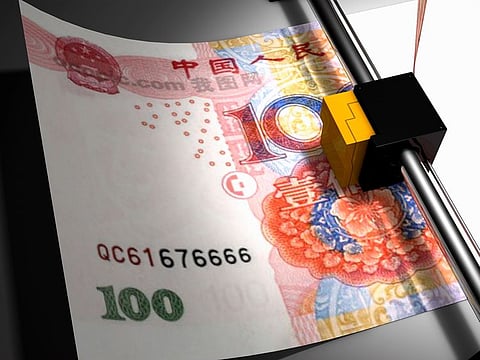China targets slower economic growth as headwinds gather
Weighing on the economy is a property downturn triggered by control on credit

Beijing: China on Saturday targeted slower economic growth of around 5.5 per cent this year as domestic headwinds, including a downturn in its vast real estate sector and lacklustre consumption, cast a pall on the outlook for the world's second-largest economy.
Gross domestic product grew 8.1 per cent last year, its best showing in a decade and beating the government's target of over 6 per cent, helped by robust exports to economies hit by COVID-19 and a low statistical base in 2020, when the pandemic began to spread worldwide.
As economic conditions began to soften, the central bank has started cutting interest rates, local governments have expedited infrastructure spending and the finance ministry has pledged more tax cuts.
"A comprehensive analysis of evolving dynamics at home and abroad indicates that this year our country will encounter many more risks and challenges, and we must keep pushing to overcome them," Premier Li Keqiang said at the Great Hall of the People as he delivered the government's work report for the year.
"In our work this year, we must make economic stability our top priority and pursue progress while ensuring stability." The budget deficit target was set at around 2.8% of gross domestic product (GDP), compared with last year's target of around 3.2 per cent of GDP.
"It may be a bit difficult to achieve the (GDP) target, and we need to take some measures to achieve it," said Zong Liang, chief researcher at Bank of China.
The consumer price index target was unchanged at around 3 per cent, while the quota for local government special bond issuances was set at 3.65 trillion yuan ($578 billion), also unchanged.
Property risks
Weighing on the economy is a property downturn triggered by a government campaign to control borrowing among highly indebted developers. An ensuing tightening in liquidity squeezed the sector and chilled buyer sentiment.
Sporadic COVID outbreaks across China and the arrival of the Delta and Omicron variants have erected further roadblocks to growth, as tough anti-coronavirus measures hit the industrial and hospitality sectors.
China will accelerate the research and development of vaccines and medicines against COVID, according to Li's report.
With COVID still a concern, this year's parliamentary meeting will be the shortest ever at 6-1/2 days.
"It is not clear how much infrastructure investment can grow in 2022 to offset such adverse effects from housing and COVID," said Zhiwei Zhang, chief economist at Pinpoint Asset Management.
"Premier Li also acknowledged the difficulty as he said 'it will take hard efforts to achieve such targets'. He didn't give similar comments last year."
There was no mention of the war in Ukraine in Li's speech, which as usual was primarily focused on economic issues.
China's 2022 defence spending will rise 7.1% from 2021, according to a separate budget report by the finance ministry, up from the 6.8% budgeted increase for last year.



